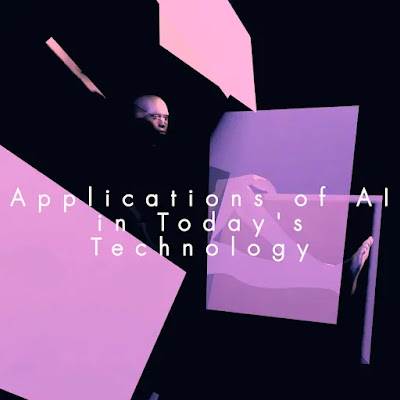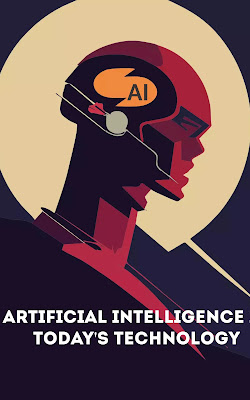The word artificial intelligence (AI) has been in use since the 1950s. It pertains to the development of devices capable of learning, solving problems, perceiving, and processing natural language tasks that ordinarily call for human intelligence.
AI is a term that is frequently used in today's technology because it is revolutionizing so many different sectors. AI is transforming how we live, work, and engage with the world. The definition of artificial intelligence, its uses in contemporary technology, and its potential for the future will all be covered in this piece of writing.
What is Artificial Intelligence?
The goal of the computer science field of artificial intelligence is to develop intelligent machines that can make choices, learn from experience, and solve issues. Broadly speaking, AI can be divided into two categories: specific or weak AI, and general or powerful AI. Narrow AI is created to carry out a single job, like playing chess, recognizing faces, or operating a vehicle. General AI, on the other hand, is a type of AI that is capable of carrying out any intellectual job that a person is capable of.
Deep learning, automation, machine learning, and natural language processing are just a few of the methodologies that make up artificial intelligence (AI). A subset of artificial intelligence called "machine learning" allows machines to learn from experience without having to be explicitly programmed. Applications like speech recognition, image identification, and natural language processing are all powered by this technology.
Neural networks are used in deep learning, a branch of machine learning, to learn from massive quantities of data. It is a technology that has made important strides in fields like speech detection, computer vision, and natural language processing.
Applications of AI in Today's Technology

Modern technology uses AI in a broad variety of ways. It is being used to raise productivity, a better quality of life, and increase efficiency. Here are a few instances of modern-day AI applications.
1. Healthcare: AI is being used in the medical field to better patient outcomes and lower costs. Devices powered by AI are being created that can track patient health and give immediate input. Medical image analysis, disease detection, and the creation of individualized treatment strategies are all made possible by AI.
2. Banking and Finance: AI is being used to enhance fraud detection, automate customer service, and create individualized investment guidance in the banking and finance sector. Predictive analytics is used to spot possible fraud and lower risks, while AI-powered chatbots are used to offer immediate customer service.
3. Retail: To enhance the consumer experience and boost sales, AI is being used in retail. Computer vision is being used to analyze consumer behavior and improve store layouts, while AI-powered chatbots are being used to make personalized product suggestions.
4. Manufacturing: To increase productivity and cut expenses, AI is being used in manufacturing. Automating repetitive chores with AI-powered robots is becoming commonplace, and predictive maintenance is being used to spot potential equipment failures before they happen.
5. Transportation: AI is being used in transit to increase safety and decrease traffic. Predictive analytics is being used to optimize traffic flow, and AI-powered autonomous vehicles that can drive themselves without human involvement are being developed.
Future of AI in Technology?

The future of artificial intelligence (AI) in technology is exciting and promising as a result of recent major advancements. AI has the power to transform several industries as well as the way we work, live, and engage with technology. The impact of AI on different industries and its future in technology will be discussed in the following piece.
1. Advancements in Robotics
One of the biggest uses of AI in technology is in robots, and as time goes on, we can anticipate them to get even smarter and more capable. Robots with AI capabilities will be able to complete jobs that are risky or challenging for humans to complete. They can, for instance, investigate deep-sea or space environments without endangering human lives.
Robots' behavior and looks are predicted to resemble humans more in the future. When conducting jobs like providing customer service or caring for the elderly, they will be more effective because they will be able to recognize and react to human emotions. Robots that use AI will also be able to learn from their interactions with people and develop better efficiency over time.
2. Personalized Medicine
By enabling personalized medicine, artificial intelligence can completely transform the healthcare sector. Massive amounts of patient data can be analyzed by AI algorithms, and these plans can be tailored to each patient's requirements. This will result in better treatment outcomes, more accurate diagnoses, and reduced healthcare expenses.
AI will continue to have a big impact on healthcare in the future. Real-time patient health monitoring made possible by AI-powered devices will enable early illness detection and prevention. Personalized treatment plans based on genetic and environmental variables will also be possible with AI, making treatments more successful.
3. Smart Cities
Cities are anticipated to become smart cities as a result of AI's increased efficiency, sustainability, and livability. Sensors, drones, and autonomous vehicles that are AI-powered will be able to gather and analyze data to improve a variety of municipal functions, including waste management, energy use, and transportation.
Future smart cities will be able to respond to changes in real-time and change to meet the requirements of their inhabitants. Traffic management systems, for instance, powered by AI will be able to optimize traffic flow based on real-time data, lowering congestion and journey times. Cities will become more sustainable as a result of the ability of AI-powered energy management systems to optimize energy use and lower carbon pollution.
4. AI in Education
AI is predicted to revolutionize education by making it more individualized and responsive to the requirements of each student. Educational technologies with AI capabilities will be able to analyze pupil data and offer individualized learning opportunities. For instance, chatbots powered by AI will be able to give pupils immediate feedback and support, enhancing their learning outcomes.
AI will continue to have a big impact on schooling in the future. Virtual reality and augmented reality are just two examples of the intense and interesting learning experiences that AI-powered technologies will be able to produce. Additionally, student data will be analyzed by AI-powered educational systems to spot learning gaps and offer personalized interventions, enhancing student success.
5. AI in Finance
AI is already advancing significantly in the financial sector, and it has a bright future. Chatbots, predictive analytics, and robotic process automation are just a few examples of AI-powered tools that are already being used to enhance risk management, fraud detection, and customer support.
AI will continue to have a big impact on banking in the future. In addition to automating financial chores like accounting and auditing, AI-powered technologies will be able to analyze enormous amounts of financial data to spot market trends and offer more individualized investment guidance.
6. Challenges and Ethical Considerations
Although AI technology has a bright future, there are still many obstacles to overcome and social issues to take into account. The potential effect of AI on employment is one of the major issues. Artificial intelligence-powered technologies may displace human workers, seriously disrupting the labor market.
In conclusion, artificial intelligence has impacted a variety of industries and our everyday lives, becoming an indispensable component of today's technology. Robots, personalized medicine, smart cities, education, and finance are just a few of the areas where
AI-powered technologies have the potential to increase effectiveness, accuracy, and output while cutting costs.
To guarantee that AI is used for society's benefit, there are, however, also important obstacles to overcome and ethical issues to be taken into account. It is essential to think about how AI will affect society as it develops and to work towards creating moral and accountable AI systems.




_11zon.png)

No comments:
Post a Comment